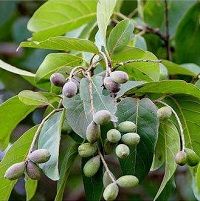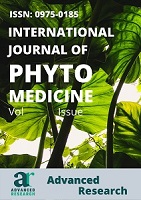Antifungal activity of Leptadenia reticulata Wight and Arn. aerial parts
Keywords:
Leptadenia reticulata Wight and Arn., Antifungal activity, Minimum inhibitory concentration, Zone of inhibition, ClotrimazoleAbstract
The petroleum ether, chloroform, acetone, methanol and aqueous extracts of the aerial parts of Leptadenia reticulata Wight and Arn. (Asclepiadaceae) were studied for in vitro antifungal activity against Aspergillus flavus, Aspergillus ruantti, Candida tropicalis, Candida albicans, Trichodermata viride and Trichodermata koningii respectively. The methanolic extract exhibited prominent antifungal activity against all the selected strains. Minimum inhibitory concentration of the extracts was performed by broth dilution method and the zone of inhibition was studied by agar disc diffusion method at concentrations of 2, 5 and 10mg/ml in DMSO. Cotrimazole (25μg/ml) was used as reference control for antifungal studies. Results of MIC study revealed the antifungal activities of the extracts against the tested strains in between concentration ranges 50-400μg/ml. The present study indicates the potential usefulness of L. reticulata aerial parts as antifungal agent.
References
WHO, The World Health Report (Changing
history, statistical annex., death by cause, sex
and mortality stratum in WHO regions,
estimates for 2002), Geneva, 2004, 120-121.
Dean DA and Burchard KW, Fungal infection
in surgical patients, Am. J. Surg., 1996, 171,
-382.
Gonzalez CE, Venzon D and Lee S, Clin.
Infect. Dis., Clinical trials for the study of
infectious diseases, 1996, 23, 515-521.
Cordell G A, Biodiversity and drug discoverya symbiotic relationship, Phytochemistry,
, 55, 463-480.
Sieradzki K, Wu SK and Tomasz A,
Inactivation of the Mithicillin resistance gene
mecA in vancomycin- resistance
staphylococcus aureus, Micro. Drug Resist.,
, 5, 253-257.
Martin KW and Ernst E, Herbal medicines for
treatment of fungal infections- a systematic
review of controlled clinical trials, Mycoses,
, 47(3-4), 87-92.
Kirtikar KR and Basu BD, In; Blatter E, Caius
JF and Mhaskar KS (Eds.) Indian Medicinal
Plants, International Book Distributors:
Dehradun, India, 1994, 1629-1630.
Anonymous. The Wealth of India-Raw
materials, NISCOM, CSIR, New Delhi, 1998,
-74.
Rastogi RP and Mehrotra BN, Compendium
of Indian Medicinal Plants, CDRI, Lucknow;
, 243-244.
Diallo C, Samake FB, Paulsen BS, Michaelsen
TE and Keita A, Wound healing plants in
Mali, the Bamaco region. An ethnobotanical
survey and complement fixation of water
extracts from selected plants, Pharm. Biol.,
, 40(2), 117-28.
Anjaria JV, Varia MR, Janakiraman K and
Gulati OD, Anti-oxidant potential of
Leptadenia reticulata Wight, Indian J. Exp.
Biol., 1975, 13(5), 448-449.
Sharma LN, Bose IJ and Rastogi AK,
Isolation of active metabolites, Indian J. Nat.
Prod., 2003, 19(3), 11-15.
Trease GE and Evans WC, Pharmacognosy,
ELBS Publication, New Delhi, 1985, 734.
Tyler VE, Brady LR and Robbers JE,
Pharmacognosy, Lea and Febiger Publication,
Philadelphia, 1985, 21.
Cruickshank R, The Practice of Medical
Microbiology, Churchill Livingstone, London,
, 98.
Karwa VG, Sathawane PN, Kasture VS,
Kasture SB and Pal SC, Evaluation of anti
fungal activity by agar disc diffusion method,
Indian Drugs, 1997, 34(3), 174-176.
Hirano R, Sasamoto W, Matsumoto A,
Antioxidant ability of various flavonoids
against DPPH radicals LDL oxidation, J. Nutr.
Sci. Vitaminol., 2001, 47, 357.
Sengul M, Ogutcu H and Adiguzel A, Anti
microbial effects of Verbascum georgicum
Bentham extract, Turk. J Biol., 2005, 29, 105-
Ozturk S and Ercisli S, The chemical
composition of essential oil and in-vitro
antibacterial activities of essential oil and
methanol extract of Ziziphora persica Bunge,
J Ethnopharmacol., 2006, 106, 372-376.
Barnabas CG and Nagarajan S, Role of
flavonoids and tannins in some medicinal
plants: a review, Fitoterapia, 1988, 3,508-510.
Burapedjo S and Bunchoo A, Antimicrobial
activity of tannins from Terminalia citrina,
Planta Medica, 1995, 61, 365-366.



